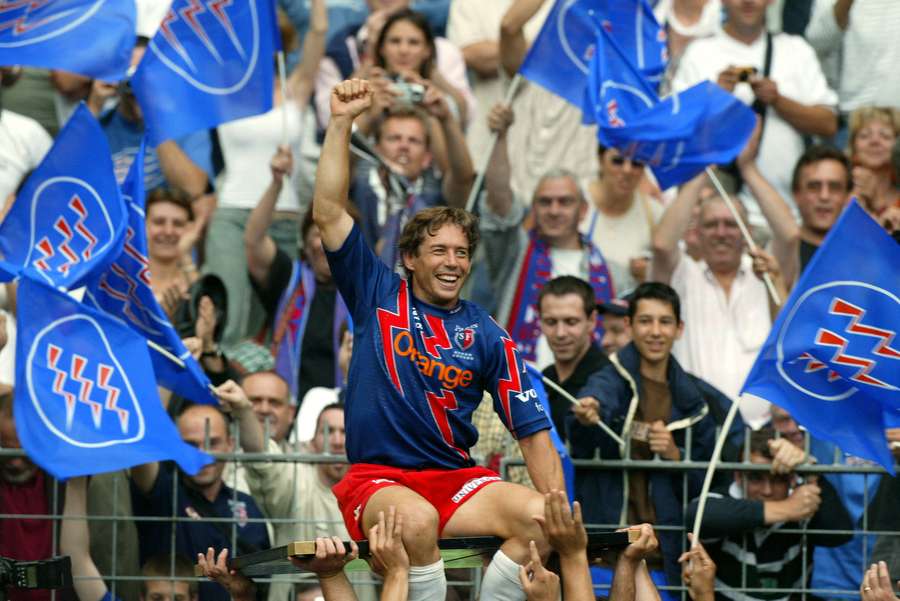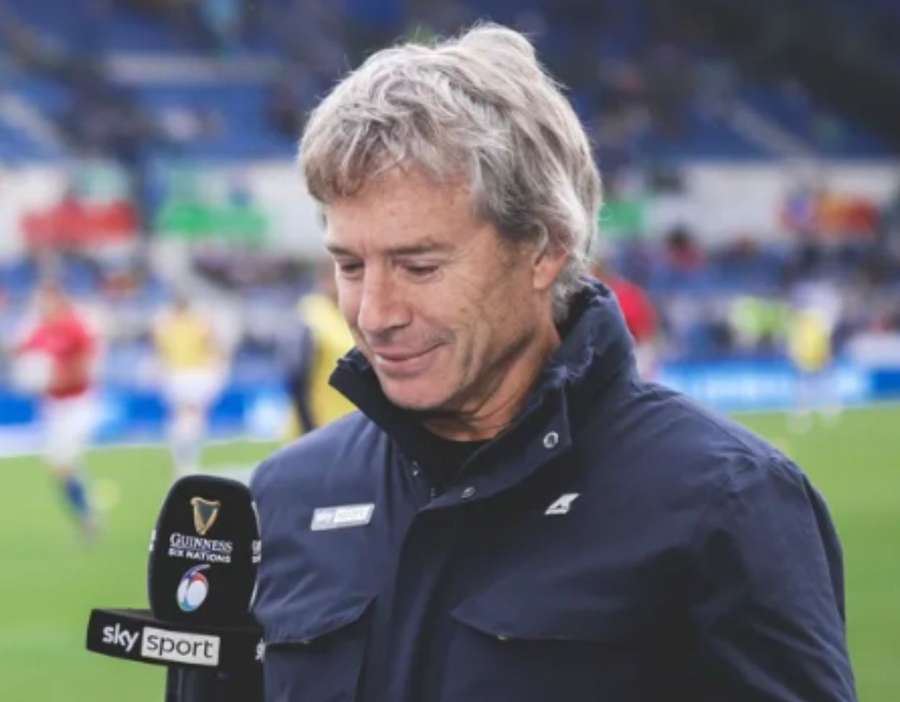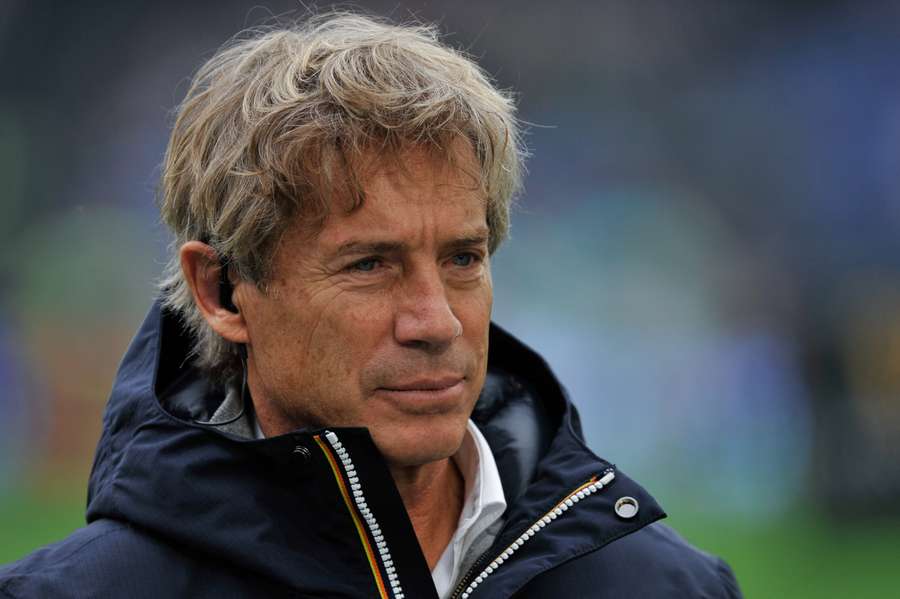There are only nine players who have managed to score over 1,000 points while playing for the national team. Among them is an Italian with an Argentine accent (or rather, cordobés), the first true international icon of Italian rugby.
When Italy took part in the first Six Nations in 2000, he was there to lead the campaign with his silky right foot and the number 10 responsibility on his shoulders. Today Dominguez continues to follow the national team no longer with an oval ball in his hand, but with the microphone of Sky Sport.
The passion which led him to become a legend of Italian and French rugby said ahead of Sunday's clash between the two sides in Rome: "I owe a lot to France, but Italy can beat them."
What memories do you have of Italy's first Six Nations?
"Scotland was the defending champion of the tournament (after winning the final Five Nations tournament in 1999), but we managed to win our first match against them against all the odds. It was a historic moment for me and for Italian rugby. It was our debut in the Six Nations: we had been preparing for that moment for three or four years. In the days leading up to the game we had enormous confidence in ourselves, and then when we saw the atmosphere in the stadium... In situations like that everything comes easy to you."
Rugby almost missed out on Dominguez as his grandfather Raffaele insisted that he should choose football.
"Yes, as a child he took me to play football. Actually, I played both sports until I was 12, but then I decided to continue with rugby only."
Given your good feet and the number on your shirt, perhaps reminiscent of those of another great Diego?
"Yes, that's true. But I'm right-handed (laughs). I have seen many of them play. Obviously Maradona was Maradona. I remember the first World Cup, then the second. It was a top moment for Argentinean football. But then, in Italy, I met the footballer who impressed me most for his attitude, professionalism and desire to win: Paolo Maldini."
Was it difficult to give up playing for the Pumas?
"Actually, I had no choice. Technically I didn't give up, they were the ones who suspended me. Having said that, playing with Italy was a completely natural choice for me. I had clear objectives. Besides, I already had Italian citizenship, even as a child. My mother was born in Italy, she's Italian, and she had wanted me and my sisters to have citizenship. And, besides, the Italian influence at home was very strong, thanks also to my grandparents. At the table we spoke Italian."
To restart after a few years of involution, Italy needed another Argentine, this time on the bench.
"Gonzalo Quesada brought a new motivation and a different speech. Besides, he speaks Italian. Yes, he speaks Italian! He managed to find an effective game system for the players we have. I loved it when he changed strategy against Wales. Italy must focus on speed because it is not a physically heavy team, but a light one. Tough but light."
A faster Italy to enhance the running skills of, among others, Ange Capuozzo.
"Exactly. Capuozzo is a player who has to play at speed, he's not a confrontational player, he's an avoidance player. He's someone who plays with his legs, at speed, advancing. He has to play in spaces at speed, if you put him in a small space he won't make it. And he still has room for improvement like all players. He just has to want it and train hard. He is changing roles; he plays a little bit full-back, a little bit on the wing, even at Toulouse where he perhaps plays more on the wing. I like him more as full-back because he becomes more unpredictable. Against Scotland, in fact, he was a bit more blocked, without touching many balls, while against Wales he was much more on the move during the whole game."
Can Italy improve on their wonderful 2024 tournament where they only lost two games?
"Of course they can improve on it. The tournament has just started, we are at the second game, they have won one and lost another, the first one (Scotland loss) was also very good. And I'll say more: at 19-all, with a bit more experience from the leaders - I'm referring to number nine and 10 - we could even have won it. In those moments when you pass the halfway line, instead of starting to play left and right, you have to play once or twice between the posts: drop, three points and go. Scotland were in great psychological difficulty after Italy's comeback, but with the try to make it 24-19 they regained their confidence. That's how games are decided. Sometimes with a technical gesture, with a beautiful action, a beautiful kick. But Italy still played a great game. Just like the performance against Wales was excellent, winning despite the bad weather, with a very intense rain. The Six Nations is wide open."
Optimist or realist?
"We still have three games left, two at home and one away. We play the last one against the strongest - so what? If we look back at the history of the Six Nations and see the things that happened.... Favourites who, in the end, ended up with three or four defeats in a row. A bit like the French team we play against on Sunday. They were candidates to win the tournament, with a Grand Slam, and instead lost (to England) and could lose other matches as well. Yes, against Italy they can lose. It won't be easy, but it could happen. Last year they had so much luck, so much luck. The game was lost. It was over, but they managed to tie it at the death."
Last year, however, there was no Antoine Dupont.
"His presence is undoubtedly an important plus because he is a great dragger, a motivator. When he is there, his team-mates bring out the best. Yes, it will be a tough match for Italy, but if it is true that Dupont will be there, it is equally true that Ntamack will not be there. And Dupont-Ntamack is the golden couple of the French national team. Ntamack is a great number 10, the most consistent of all and no, he won't be there."
In short, Italy can really think about beating France 12 years on from the last time they did it.
'Yes, you have to have confidence, you have to continue with the same attitude that Italy has had so far. The dynamic seen between the first and second game is 'on the rise'. We have to continue with this very aggressive defence in the one-on-ones and fight a lot. Focus on footwork, as we did against Wales, and maintain effectiveness in the aerial fight."
The feeling is that France are achieving the right mix of experience and young talent?
"They have very experienced players and some youngsters who are coming into the team well. The fact is that these youngsters play the strongest league in the world every weekend. And they have not been playing it for a week, but for at least two years. They play tough Test matches every week, so in that respect they have a bit of an advantage. Having said that, we already have eight players playing in the French Top 14/ProD2 and that is a very positive thing."
Italy-France is a bit of a European derby and extra special for you?
"It is indeed. I had some great years in France. I played in an extraordinary club, with 140 years of history, one of the oldest in the country. It was really incredible to win four titles in eight years. France is a country that has given me so much affection and so many opportunities, I owe them so much."

Can Les Bleus trouble Ireland until the end?
"Absolutely, France is still a candidate, although Ireland has a bit more of an advantage. However, the Irish now have to go to Wales and although they are super favourites, it will not be easy because the Welsh won't give in easily. And, then, they will have to play against France and come to Rome. So, watch out, the tournament is still wide open."
What reading do you make of Ireland's dominance in recent years: their own merits or the demerits of others?
"Absolutely own merits. All their provinces play competitive rugby. Leinster is the number one team in the world. They have managed to give an organisational identity to all their provinces and they have done a great job on training: the Irish supply chain is very strong. Every year three or four new players burst onto the scene and they are very strong and competitive. They have set up a real winning model."

England, on the other hand, constantly alternate between highs and lows.
"Yes, it is true that they lost so many Test matches in November, but it is also true that they could have won them all because they lost by three to four points. And then they lost to the All Blacks, South Africa.... It's not easy. I think England are also on a good path, although they certainly lack some quality players. Unlike Ireland, in fact, the English national team has no champions in seven to eight key roles and does not even have two or three strong options per role. Just think of what is happening with the number 10: they have been changing for three or four years. One comes in, then another one comes in and yet another one who first plays well and then badly. They have not been able to find the regularity that players like Jonny Wilkinson and Owen Farrell gave them. But even with regard to number nine - and we are talking about two key roles - they are unable to have consistency. In Ireland, on the other hand, although Sexton was there for a long time because he was so strong, today we are seeing how there are at least a couple of players, both strong, who are fighting to be starters."
Why hasn't Scotland won the Six Nations since its inception in 2000, despite being the last champions of the Five Nations?
"The same thing applies to them as it did to England. They lack players and now that they have to go to England they have been unlucky with Finn Russell and Darcy Graham. And their replacements are not at the same level. It's not a question of having stronger reserves, but at least more or less equal. That, then, is a bit of a problem that Italy also has: we don't have three to four strong players for each role, we are limited."
Are Wales are heading for their second consecutive wooden spoon?
"There are still three games to go. Let's take it easy. They are certainly going through a very bad time also because of everything that has happened off the pitch: the problems of the federation, the economic problems of the clubs... All that has had a very negative effect on the group. Maybe they handled the situation badly. Not to mention the retirement of some legendary players like Alun Wyn Jones, who has proven difficult to replace. All their problems came suddenly, they had not foreseen anything, least of all this famine of quality players. I am sure they are asking themselves more than a few questions about what has been done, in recent years, in terms of training young people. But they are not the only ones wondering. There was a time when very strong youngsters were coming out all over the place. Today, however, very few emerge every year."


